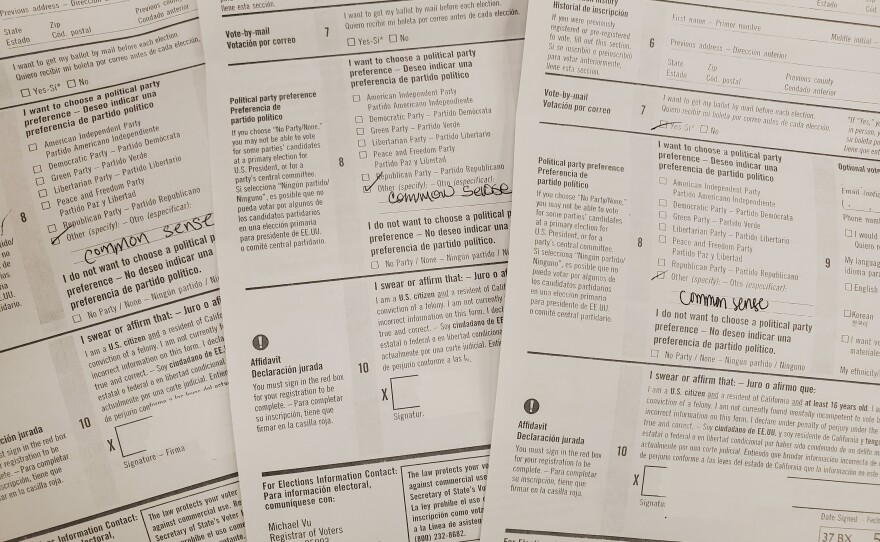Scott Lewis, Voice of San Diego
Claire Tregeser, KPBS News
Jennifer Bowman, inewsource
Erik Anderson, KPBS News
The job of the elected city attorney sounds straightforward: to give legal advice to city departments and officials. The three candidates for San Diego city attorney — incumbent Mara Elliott, attorney Cory Briggs, and former deputy city attorney Pete Mesich — have different views on what the job actually entails. Briggs, who frequently sues the city, is trying to make the race a referendum on Elliott’s first three years in office by attacking her integrity, supposed secrecy and focus on politics.
RELATED: Cory Briggs Brings Controversial Record To San Diego City Attorney’s Race
RELATED: Three Candidates Face Off For San Diego City Attorney
San Diegans tricked into registering with Common Sense Party
It doesn’t make much sense. About 5,000 people have signed up for the new Common Sense Party in San Diego County. KPBS contacted 30 members of the party who had no idea they had registered with that organization. Michael Vu, the county Registrar of Voters, says this may amount to registration fraud. The party, started by former Bay Area Republican Congressman Tom Campbell, aims to provide an alternative to Republicans and Democrats. The party needs 67,000 people to join Common Sense in order to qualify as an official party on future ballots.
RELATED: Signature Gatherers Duped San Diegans Into Signing Up For New Political Party
Measure C draws big money, opposition
The push to expand the San Diego Convention Center has amassed more than $2 million in donations ahead of the March primary. Measure C calls for an increase in the city’s hotel room tax, which varies from 1.25% to 3.25% with hotels closer to the convention center seeing a steeper increase. The measure would raise billions of dollars that would be used to expand the convention center and on homeless programs and street repairs. Big hotels like the Marriott, Hilton and Manchester Grand have contributed more than half the funds raised for the campaign. Michael McConnell, a homeless advocate, has put some $236,000 of his own money into defeating the measure.
RELATED: Measure C Asks San Diego Voters To Approve New Hotel Tax
Related: Hotel Industry Pushes Passage Of Measure C To Expand San Diego Convention Center
Measure A: rural housing projects will need voter approval
San Diego County spent years hashing out a new General Plan that clusters new housing in rural areas near villages, services and jobs. But since it was adopted in 2011, the Board of Supervisors has approved several backcountry developments outside plan guidelines. Measure A changes the process for approving housing developments in isolated areas. Instead of letting the San Diego County Board of Supervisors have final approval, voters countywide would weigh in on projects with six houses or more, if those projects require an amendment to the General Plan and if they increase housing density on rural or semi-rural lands. The effort to defeat Measure A is mostly funded by developers, contractors and realtors.
RELATED: Measure A Would Dramatically Change How Rural Land Is Developed In San Diego County








